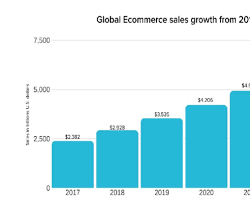
Ecommerce Business Investment: A Comprehensive Guide to Online Success in today’s digital age, ecommerce has revolutionized the way we shop and do business. With the rise of online marketplaces and the increasing number of internet users, investing in an ecommerce business has become a lucrative opportunity for entrepreneurs and investors alike. This comprehensive guide will delve into the key aspects of ecommerce business investment, providing valuable insights to help you make informed decisions.
Understanding the Ecommerce Landscape
Before diving into the investment aspects, it’s crucial to understand the current landscape of ecommerce. The global ecommerce market is booming, driven by factors such as the convenience of online shopping, the growing middle class in emerging economies, and the increasing adoption of smartphones and mobile internet.

graph showing the growth of global ecommerce sales over the past decade
Some of the key trends shaping the ecommerce industry include:
- Mobile commerce: With the proliferation of smartphones, mobile shopping has become a significant force in the ecommerce world. Businesses need to optimize their websites and apps for mobile devices to cater to this growing segment of online shoppers.
- Social commerce: Social media platforms have evolved into powerful sales channels, allowing businesses to connect with customers and drive sales directly within these platforms.
- Voice commerce: Voice assistants like Amazon Alexa and Google Assistant are gaining popularity, enabling customers to shop using voice commands. Businesses need to optimize their product listings for voice search to stay ahead of the curve.
- Cross-border ecommerce: As consumers become more globalized, there is a growing demand for cross-border shopping. Businesses need to navigate the complexities of international shipping, customs, and payment processing to tap into this market.
The Benefits of Investing in Ecommerce
Ecommerce Business Investment Investing in an ecommerce business offers a multitude of benefits, including:
- Lower overhead costs: Compared to traditional brick-and-mortar businesses, ecommerce businesses typically have lower overhead costs, such as rent, utilities, and inventory storage.
- Global reach: Online businesses can reach a global audience, expanding their customer base beyond geographical boundaries.
- 24/7 operations: Ecommerce stores are open 24/7, allowing customers to shop at their convenience.
- Data-driven insights: Ecommerce platforms provide valuable data on customer behavior, allowing businesses to make data-driven decisions to optimize their operations.
- Scalability: Ecommerce businesses can be easily scaled up or down to meet changing market demands.
Key Factors to Consider Before Investing
Ecommerce Business Investment Before investing in an ecommerce business, it’s essential to consider the following factors:
- Market research: Conduct thorough market research to identify a niche market with high potential and low competition.
- Business plan: Develop a comprehensive business plan outlining your business goals, target market, marketing strategy, financial projections, and exit strategy.
- Ecommerce platform: Choose a reliable and user-friendly ecommerce platform that suits your business needs and budget. Popular options include Shopify, Magento, WooCommerce, and Big
- Product sourcing: Secure reliable suppliers or manufacturers to source high-quality products at competitive prices.
- Marketing and branding: Invest in effective marketing strategies, including SEO, social media marketing, email marketing, and paid advertising, to attract and retain customers.
- Logistics and shipping: Establish efficient logistics and shipping processes to ensure timely delivery of products to customers.
- Customer service: Provide excellent customer service to build customer loyalty and positive brand reputation.
- Financial management: Maintain accurate financial records and track key performance indicators (KPIs) to monitor the financial health of your business.
Investment Strategies for Ecommerce Businesses
Ecommerce Business Investment There are several investment strategies to consider when investing in an ecommerce business:
- Direct investment: Invest directly in a promising ecommerce startup or existing business.
- Venture capital funds: Invest in venture capital funds that specialize in ecommerce investments.
- Crowdfunding: Raise funds through crowdfunding platforms to support the growth of ecommerce businesses.
- Ecommerce stocks: Invest in publicly traded ecommerce companies listed on stock exchanges.
Risks and Challenges
Ecommerce Business Investment While ecommerce offers significant opportunities, it’s important to be aware of the associated risks and challenges:
- Competition: The ecommerce industry is highly competitive, and businesses need to differentiate themselves to stand out from the crowd.
- Cybersecurity threats: Ecommerce businesses are vulnerable to cyberattacks, such as hacking and data breaches.
- Supply chain disruptions: Disruptions in the supply chain can impact the availability of products and lead to delays in shipping.
- Economic downturns: Economic downturns can negatively impact consumer spending, affecting ecommerce sales.
Conclusion
Ecommerce Business Investment Investing in an ecommerce business can be a rewarding venture with the potential for high returns. By carefully considering the factors discussed in this guide and implementing sound business strategies, investors can increase their chances of success in the dynamic world Ecommerce Business Investment
Opens in a new windowfastercapital.com
successful ecommerce entrepreneur celebrating a milestone
Additional Tips for SEO Optimization
To improve the SEO of your article and increase its visibility on Google, consider the following tips:
- Keyword research: Use relevant keywords throughout the article, including the focus keyword “ecommerce business invest.”
- Meta description: Write a compelling meta description that summarizes the article and includes the focus keyword.
- Header tags: Use header tags (H1, H2, H3, etc.) to structure the content and highlight important sections.
- Image optimization: Optimize images with relevant file names and alt text that include the focus keyword.
- Internal and external linking: Link to relevant internal pages and high-quality external websites to improve your website’s authority.
- Mobile optimization: Ensure the article is mobile-friendly to cater to the growing number of mobile users.
- Page speed: Optimize the page speed to improve user experience and search engine rankings.
By following these tips and consistently creating high-quality content, you can increase your chances of ranking among the top three results on Google for the keyword “ecommerce business invest.”

